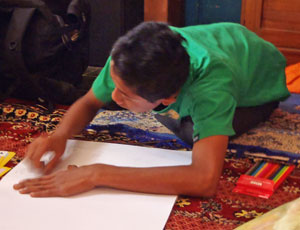Sixteen-year-old Irfan Nurhapidin is deaf and lives in West Java. It is an area that is prone to earthquakes, volcanoes, landslides and a multitude of other natural disasters. Children with disabilities are among the most vulnerable, and this vulnerability is increased in times of disaster.
To reduce this vulnerability, the AusAID-funded Australia–Indonesia Facility for Disaster Reduction (AIFDR) is helping Irfan's family, neighbours and community better understand the risks posed by disasters, and to know exactly what to do if a disaster strikes.
Irfan is a beneficiary of a community based disaster risk reduction program that focuses on including women and children with a disability in disaster planning.
The program has trained women's groups to provide life-saving information on evacuation procedures, first-aid, safe house construction and indoor safety procedures. These women went on to conduct training in 15 villages in Indonesia.
Irfan was an enthusiastic participant who joined in disaster evacuation simulations and later explained evacuation procedures to his family, friends and neighbours through drawing pictures of what he'd learnt. He also encouraged his family to reorganise the household furniture, to improve safety in the event of a natural disaster such as an earthquake.
This AusAID-funded program, conducted between June 2011 and August 2012, worked with more than 100 children with disabilities and their families. AusAID also assisted the district and sub-district local governments in West Java to ensure contingency planning for people with disabilities was included in the District Disaster Management Plan, the District Action Plan and the Landslide Contingency Plan.
The program is called Widening the Participation of Women and Children with Disabilities in Community Focused Disaster Risk Reduction.

